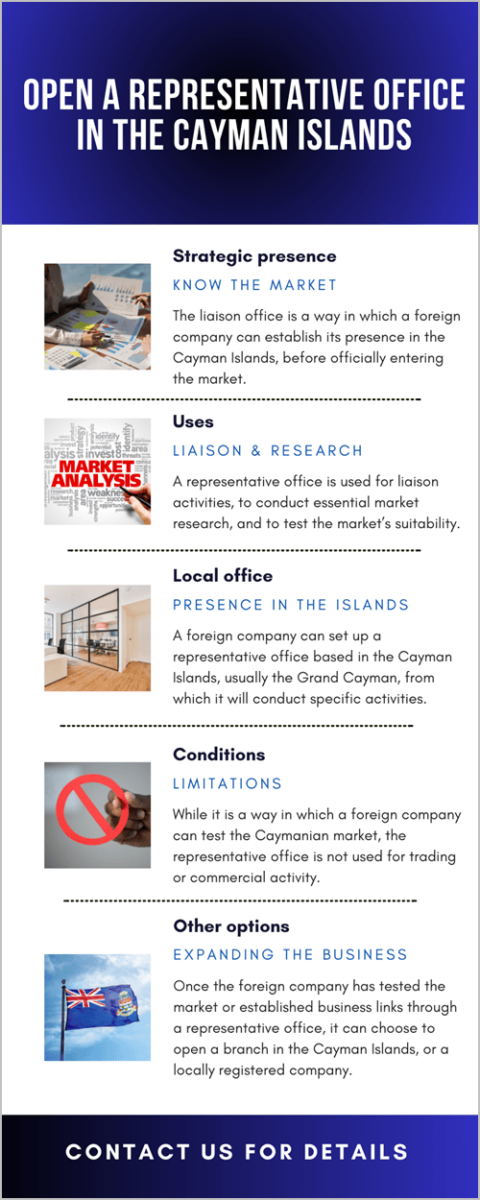A representative office in the Cayman Islands is a business presence used for marketing, research, and liaison purposes. The jurisdiction primarily focuses on offshore financial services, including hedge funds, investment funds, and banking services. However, our team can help you in the process of Cayman Islands incorporation for liaison offices.
Table of Contents
What is a representative office in the Cayman Islands?
The Cayman Islands does not have a specific legal framework for representative offices. Instead, most businesses that operate in the Cayman Islands are set up as exempted companies or limited liability companies to conduct their primary activities.
A liaison office in the Cayman Islands is established to maintain a minimal presence. In this setup, the primary purpose is representing the interests of the parent company, conducting market research, and facilitating communication between the parent company and potential business partners or clients in the Cayman Islands.
Representative offices are restricted from engaging in business activities such as: sales, contracts, or revenue generation. Their role is to conduct non-profitable activities.
Representative offices in the Cayman Islands do not have a separate legal identity from the parent company. Therefore, they are not responsible for contracts or debts incurred in the foreign country.
We can help you set up a company in the Cayman Islands or liaison office.
Differences between a branch and a liaison office
A representative office in the Cayman Islands is the simplest and most limited form of establishing a business presence in the country. It acts as an initial entry point for a company that’s interested in exploring business opportunities in a new market. Liaison offices are restricted from generating revenue.
Despite this limitation, a representative office can have employees in the Cayman Islands and play essential roles, such as: market research, negotiating with local companies, and promoting products or services without directly engaging in profit generation. From a tax perspective, a representative office in the Cayman Islands typically has minimal tax obligations, primarily related to employee salaries and costs associated with the location (rent, utilities, office supplies, etc.).
In contrast, a branch office represents a more substantial commitment to a foreign market. A branch is a direct extension of an existing legal entity within a company group into the country.
Unlike the liaison office in the Cayman Islands, branches are allowed to engage in revenue-generating activities and are often subject to taxes on their earnings in the foreign country.
The choice between opening a branch or a representative office in the Cayman Islands depends on your business needs. We can help you with the Cayman Islands company formation.
Why set up a business presence in the Cayman Islands
Establishing a business presence in the Cayman Islands can be a strategic move for several reasons. It offers substantial tax benefits, with no direct taxes on income, capital gains, or property taxes. The jurisdiction serves as a prominent global financial hub, and the Cayman Islands exempted companies are a popular choice for investors.
Additionally, the Cayman Islands has a strong and stable economy, which provides a favorable backdrop for setting up a business. Here are a few statistics about the Cayman Islands’ economy:
- The Cayman Islands GDP was evaluated at 6.84 billion US dollars in the year 2022;
- The number of tourist arrivals in the Cayman Islands increased significantly from 17,300 tourists in 2021 to 184,300 tourists in 2022;
- Exports from the Cayman Islands increased to 31.6 million KYD in 2022, from 14.3 million KYD in 2021.
If you need more information about opening a representative office in the Cayman Islands, please contact our team. We can also assist in situations such as immigration to the Cayman Islands.



